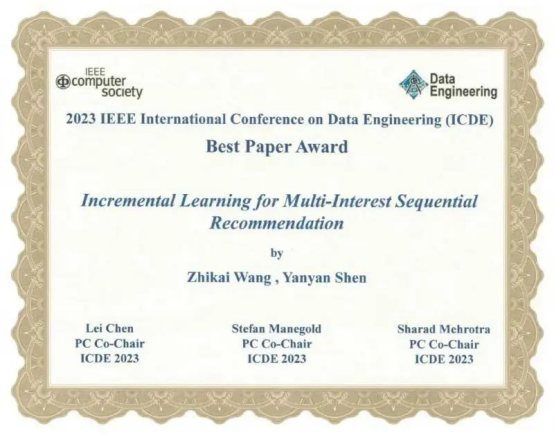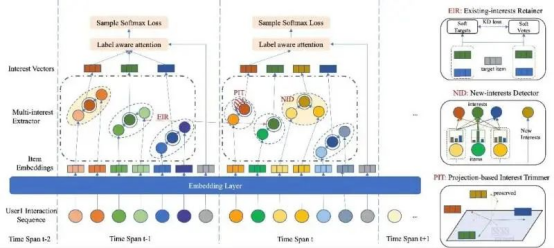Recently, ICDE 2023 (IEEE International Conference on Data Engineering), one of the top conferences in the field of database, was held in Anaheim, California, USA. The students from the Coefficient Driving Software Technology Lab, School of Electronic Information and Electrical Engineering Computer won the single best paper award for the incremental learning research recommended by multi-interest sequences.

The paper won the award was titled "Incremental Learning for Multi-Interest Sequential Recommendation", which proposed a set of incremental learning framework for multi-interest sequential recommendation model. It can not only retain the user's interest mined from the historical interaction sequence, but also detect the user's new interest from the new interaction sequence. It can also realize the adaptive update and dynamic expansion of the user's interest, and achieve advanced performance in the multi-interest sequence recommendation task.
Research Background
Multi-interest Sequential Recommendation (MSR) through analyzing the interaction sequence between users and items, mining multiple potential interests of users, and making use of multiple interests of users for item recommendation. This technology has been widely concerned by the academic and industry because of its excellent recommendation performance. The actual recommendation system will constantly collect the latest interaction sequence of users. In this process, the existing interests of users may be deviated and new interests will be generated. How to update the multi-interest sequence recommendation model by using the latest interaction data is an important research topic.
At present, the widely used model updating methods mainly include complete retraining and incremental learning. The former captures all the interest contained in the user's historical interaction sequence, but incurs high training costs. The latter only uses incremental data to fine-tune the model. Although the training time and memory cost is small, it is easy to forget the existing interests in the historical interactive data, and it cannot dynamically expand the model to describe the new interests of users, so the effect is limited. Therefore, it is necessary to propose an incremental learning framework for multi-interest sequential recommendation system, which has the ability to retain users' existing interests and dynamically capture users' new interests.

Research Result
In the paper, it proposes an incremental learning framework for multi-interest sequential recommendation model IMSR, which can not only fine-tune existing interests of users, but also dynamically extend the model to describe new interests of users. The IMSR framework contains three important components: the existing interest retainer, the new interest detector, and the interest trimmer. Retention of existing interest which is designed to ensure that representations of existing interest are not removed from their original location during incremental learning of the model.
The paper uses the idea of knowledge distillation to calculate the distillation loss function according to the sequence of existing interest and new interaction, so as to restrict the change of existing interest. The new interest detector is responsible for judging whether the user has a new interest according to the correlation between the newly interacting item and the existing interest, and timely expands the model to capture the new interest after the new interest is detected. Interest trimmer trims trivial new interests by using spatial projection of interest representation, deletes redundant interests, and finally determines the number of new interests. Through the above components, IMSR can not only preserves the existing interests of the user, but also dynamically creates new interests for each user that evolve from the new sequence of interactions. The experimental results on multiple multi-interest sequence recommendation data sets show that compared with the current advanced incremental learning methods, the IMSR training model achieves better recommendation performance.
